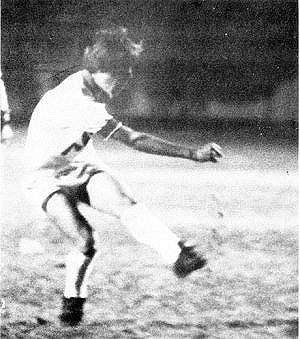Soil compaction caused by hundreds of students on a day-in and day-out basis, limited grass recovery time and water ponding are problems all too familiar to stadium groundskeepers. The situation at St. Louis University High School was no different at their two athletic fields. An extensive renovation plan for their main stadium stadium involved the construction of a new grandstand and pressbox, a concession building, equipment storage building, tracks, and soccer and football fields with an automatic irrigation system. As water ponding was a problem with their upper practice field, a solution was sought for the new stadium.
 |
Horticultural Perlite Specified
Natural soil in the stadium area was a hard clay that had little or no permeability. As a result, water ponding and compaction was a problem. At the suggestion of their stadium manager, Emmet Hanic, horticultural perlite was specified on the basis of extensive studies in Japan that indicated that horticultural perlite would limit compaction of park and stadium turf areas subject to heavy foot traffic. 1/3 Perlite 2/3 soil Mix Used Existing clay soil was disked to a depth of 8 inches and horticultural perlite was spread on the surface in sufficient quantity to form a 1/3 perlite 2/3 soil mix. Fertilizer was added and the three elements blended together. The entire playing field was contour graded with an 8 inch crown down the center of the field. The field was seeded with Kentucky 31 fescue and covered with a straw mulch. Dimensions of the soccer field are 120 x 53 yards and the adjoining football field 120 x 53 yards. No Evidence of Compaction After hundreds of soccer and football games, Hanick reported "the soil had not compacted and remained soft to the touch." He added, "the untreated upper field was spotty with dry areas and a hardened clay surface that did not allow penetration of moisture while the turf in the new stadium recovered rapidly after play and remained in lush condition." "An additional benefit of the new, softer playing surface is the fact that no serious player injuries were sustained" said Paul Martel, head football coach. According to Father Thomas W. Cummings, President of the school, "our only regret is that we did not renovate our fields earlier with horticultural perlite -- we are delighted with the tremendous improvement in both the appearance and the performance of our turf." Characteristics of Perlite Perlite is a unique volcanic mineral which expands to about 13 times its original volume when it is heated to a temperature of approximately 1700°F. During the heating process, the mineral particles pop like popcorn and form a granular, snow-white material so light in density that it weighs only about 5 to 8 pounds per cubic foot. Each particle of perlite is sterile, has essentially a neutral pH. and is comprised of tiny closed air cells or bubbles. The surface of each particle is covered with tiny cavities which provide an extremely large surface area. These surfaces trap moisture and nutrients and make them available to turf roots. In addition, because of the physical shape of each particle, air passages are formed in the soil mix thus providing optimum aeration and drainage.
The Schundler Company
Back to Horticultural Main Page
"AFTER HUNDREDS OF SOCCER AND FOOTBALL GAMES THE SOIL HAD NOT COMPACTED AND REMAINED SOFT TO THE TOUCH."
"WE ARE DELIGHTED WITH THE TREMENDOUS IMPROVEMENT IN BOTH THE APPEARANCE AND THE PERFORMANCE OF OUR TURF."
For more information about these uses of perlite and vermiculite, please call or contact us at:
10 Central Street
Nahant, MA 01908
(ph)732-287-2244 (fax) 732-287-4185
www.schundler.com
email: info@schundler.com